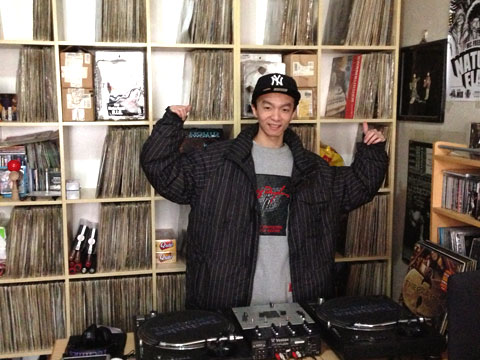Interview with the rapper
A Q&A with Beijing hip hop luminary Nasty Ray
Nasty Ray is a Beijing rapper straight out of the hutong. He was born in 1988, and lives in the west of town with his mum. ("Welcome 2 da hood, this is Tuanjiehu / I live in 20Two", goes one lyric.) His walls are covered with basketball posters and his own sketches, and one room is a shedload of vinyls and decks. For a taste of his music, go to his Douban page. And for an open sesame to more Chinese hip hop, also check out Yin Cang, Yin San'er and Hei Yun.
•
When did you begin to listen to hip hop?
The same time I started watching the NBA [basketball], in the fifth or sixth grade. I read a lot of basketball magazines, and in interviews with NBA stars they all said they liked Jay Z. So I went to find his CD, and that was the start for me. It was a style and a feeling I liked.
How did you come to start rapping yourself?
In 2004, when I was 16, I joined MC battles at a really well known club called Good Luck on Lady Street [Beijing]. And since 2005 there was a place called Taboo Club in in Wudaokao which would also have MC battles, and there I won first place, when I was 17.
Then from the first year of university, I was already working as an editor for a hip hop website. In university I studied piano tuning. Now I can rely on hip hop to live, but the majority can’t. They need a day job, they can’t only do hip hop.
Tell us about the parties that you organise.
Every month I put on a party called Natural Flavor. So I spend a lot of time organising and promoting that. They’re parties, not concerts. If it’s the same word, people are misled. Beijing is all about concerts now, but a party isn’t the same – maybe people only arrive at midnight and it goes on until four or five in the morning.
Beijing didn’t have real hip hop parties, so I hoped that every month there could be a space for people to get together, listen to hip hop classics, make people happy and make more people understand hip hop and its history.
Does Chinese hip hop have any special characteristics?
Chinese has four tones, and English only one, it’s all the same intonation, so there’s more scope for rhyming and wordplay in Chinese.
Can you give us an example?
Listen to my song Tuanjiehu.
What’s it about?
It’s about this neighbourhood, what this street is like, because I’ve lived here since I was little. But in fact I’m talking about a wider scope, about Beijing. The first verse is about the morning, the second verse is about the afternoon, the third verse is about the evening and night. I rap about what I see and do, like going out to buy bootleg CDs, with petty thieves and prostitutes around and so on.
When and how did Chinese hip hop begin?
About ten years ago. Or at the earliest in the mid nineties. At that time lots of people were going to nightclubs, which were playing all kinds of music, from rock to house to hip hop, including foreign rap. So brothers would go specially to those places, and listen right until the end. There was one club in especial called Glass House, with a black DJ who would play hip hop.
Then Chinese hip hop started out of that. There’s lots of restrictions in China, including on hip hop. Because it’s not a mainstream thing. Now hip hop culture includes rap, street dance, skateboard, graffitti.
How do other Chinese on the street look at you?
They look at the big clothes I wear, and don’t understand it. Because my style is traditional, early New York style. In fact a lot of hip hop people don’t dress like I do, they just wear normal clothes, like Mos Def.
Does your mum support your music?
Sure, because she can see that I’ve had some success, and I can earn money. So if you can make a living doing what you like then that’s great. She doesn’t understand the music at all. But right from when I was little I did what I wanted, no one could control me.
What do you think is the difference between your generation and the one before it?
I think the post 80s are in a golden age. They’ve experienced more things, and received fresh new impressions, like from TV programmes and other cultures. So this generation has a lot of talent. Most of the people doing music in China are post 80s.
What about the post 90s?
Actually, I don’t like the post 90s. There’s a generation gap between us. Even if someone was born in 1991, they’re only three years younger than me, but there are lots of things they don’t know. Like the animated films from when I was young, like GI Joe, my friends born in 1980 or 1981 have all seen them, but the post 90s haven’t heard of them. It’s incredible!
•


















